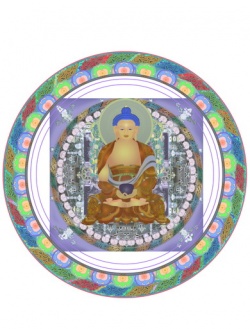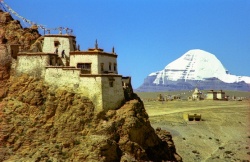Difference between revisions of "The Lokayata Philosophy"
(Created page with " <poem> First and foremost, we find in Lokayata philosophy a total rejection of supernaturalism (soul, other world, heaven, gods, e...") |
|||
| Line 1: | Line 1: | ||
| − | + | {{DisplayImages|143|469}} | |
<poem> | <poem> | ||
First and foremost, we find in [[Wikipedia:Cārvāka|Lokayata]] [[philosophy]] a total rejection of supernaturalism ([[soul]], other [[world]], [[heaven]], [[gods]], etc.). It is a completely this-worldly or {{Wiki|secular}} [[philosophy]]. Secondly, it is a [[Wikipedia:Hedonism|hedonistic]] [[philosophy]]. In other words, it regards [[human]] [[happiness]] as the [[highest]] [[ethical]] end. It rejects [[imaginary]] [[ethical]] ends like [[attainment]] of [[heaven]] and [[moksha]] or [[nirvana]] and clearly asserts that one should not run away from [[life]] just because [[pleasure]] in [[life]] is mixed with [[pain]]. The basic [[idea]] of [[Wikipedia:Cārvāka|Lokayata]] [[philosophy]] is: this [[world]] is the only [[world]], this [[life]] is the only [[life]] and one should make the best of it. This basic [[idea]] is shared by contemporary Humanists - therefore, [[Wikipedia:Cārvāka|Lokayata]] is [[humanistic]]. | First and foremost, we find in [[Wikipedia:Cārvāka|Lokayata]] [[philosophy]] a total rejection of supernaturalism ([[soul]], other [[world]], [[heaven]], [[gods]], etc.). It is a completely this-worldly or {{Wiki|secular}} [[philosophy]]. Secondly, it is a [[Wikipedia:Hedonism|hedonistic]] [[philosophy]]. In other words, it regards [[human]] [[happiness]] as the [[highest]] [[ethical]] end. It rejects [[imaginary]] [[ethical]] ends like [[attainment]] of [[heaven]] and [[moksha]] or [[nirvana]] and clearly asserts that one should not run away from [[life]] just because [[pleasure]] in [[life]] is mixed with [[pain]]. The basic [[idea]] of [[Wikipedia:Cārvāka|Lokayata]] [[philosophy]] is: this [[world]] is the only [[world]], this [[life]] is the only [[life]] and one should make the best of it. This basic [[idea]] is shared by contemporary Humanists - therefore, [[Wikipedia:Cārvāka|Lokayata]] is [[humanistic]]. | ||
Revision as of 02:56, 28 December 2013
First and foremost, we find in Lokayata philosophy a total rejection of supernaturalism (soul, other world, heaven, gods, etc.). It is a completely this-worldly or secular philosophy. Secondly, it is a hedonistic philosophy. In other words, it regards human happiness as the highest ethical end. It rejects imaginary ethical ends like attainment of heaven and moksha or nirvana and clearly asserts that one should not run away from life just because pleasure in life is mixed with pain. The basic idea of Lokayata philosophy is: this world is the only world, this life is the only life and one should make the best of it. This basic idea is shared by contemporary Humanists - therefore, Lokayata is humanistic.
There is no doubt about Lokayata being materialistic and naturalistic. Its doctrine that earth, fire, air and water are the only elements is similar to that of ancient Greek materialist Empedocles, just as its hedonism is similar to that of ancient Greek hedonists, Aristippus and Epicurus.
In the Indian context, Lokayata rejects the authority of the Vedas, the Vedic rituals and the varna-ashrama dharma (the caste system). Thus, there is a clear and strong rejection of Brahminism. It may even be called anti- Brahminism. The naturalism and materialism of Lokayata and its rejection of Vedic rituals as merely means of livelihood for Brahmin priests, implies rejection of the gods. Thus, Lokayata is atheistic. In fact, Lokayata is the only school of ancient and medieval Indian philosophy which is atheist (nastika) in all the three senses of the term. It rejects the soul and the so-called other-world. It rejects gods as well as the authority of the Vedas.
To sum up, Lokayata is a secular and nastika philosophy. We find naturalism, hedonism, humanism, materialism, atheism and anti-Brahminism in Lokayata. Thus, from a rational, humanist point of view it may be described as the genuine wisdom of ancient India.
Dr. Ramendra teaches Philosophy in Patna, and is President of the Bihar Rationalist Society.

